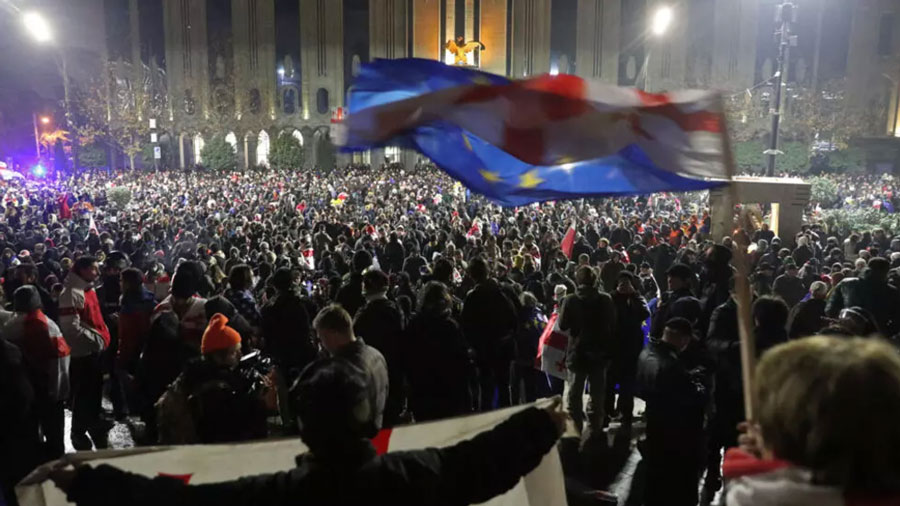

Protests have broken out in the Georgian capital as demonstrators blockaded the port of Poti
Protesters clashed with police in the Georgian capital Tbilisi for the fourth night in a row on Monday, amid signs that protests against the government's suspension of EU accession talks are spreading across the country.
Tens of thousands of pro-EU and pro-EU demonstrators in Georgia took to the streets of the capital Tbilisi on Saturday for a third straight night of protests.
Police reportedly used water cannon and tear gas to disperse protesters, and more than 100 people were arrested.
The move was seen as a further sign of US displeasure with the direction of Georgian government policy amid growing social divisions over democratic governance and membership of the European Union.
Georgia, a nation of 3.7 million people, has seen months of tension between the ruling Georgian Dream party and the opposition. The opposition has accused the party of becoming increasingly authoritarian and pursuing anti-Western, Pro-Russian policies.
POTI port is the main port in Georgia, handling about 80% of container traffic. Protesters blocked at least one road to the port, which is managed by APM Terminals, a unit of Maersk.
Protesters blocking access to the port of Poti are part of a wider wave of unrest across the country. The protests are reported to have spread to eight cities and towns outside Poti and Tbilisi.

The mass protests in Georgia were triggered by the government's decision to postpone talks on the country's accession to the European Union until 2028. The opposition said the decision had a Pro-Russian authoritarian bent.
Tens of thousands of pro-EU and pro-EU demonstrators in Georgia took to the streets of the capital Tbilisi on Saturday for a third straight night of protests.
Police reportedly used water cannon and tear gas to disperse protesters, and more than 100 people were arrested.
The move was seen as a further sign of US displeasure with the direction of Georgian government policy amid growing social divisions over democratic governance and membership of the European Union.
Georgia, a nation of 3.7 million people, has seen months of tension between the ruling Georgian Dream party and the opposition. The opposition has accused the party of becoming increasingly authoritarian and pursuing anti-Western, Pro-Russian policies.
POTI port is the main port in Georgia, handling about 80% of container traffic. Protesters blocked at least one road to the port, which is managed by APM Terminals, a unit of Maersk.
Protesters blocking access to the port of Poti are part of a wider wave of unrest across the country. The protests are reported to have spread to eight cities and towns outside Poti and Tbilisi.





